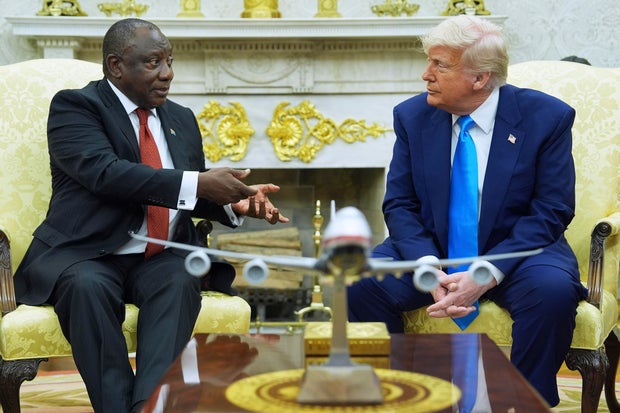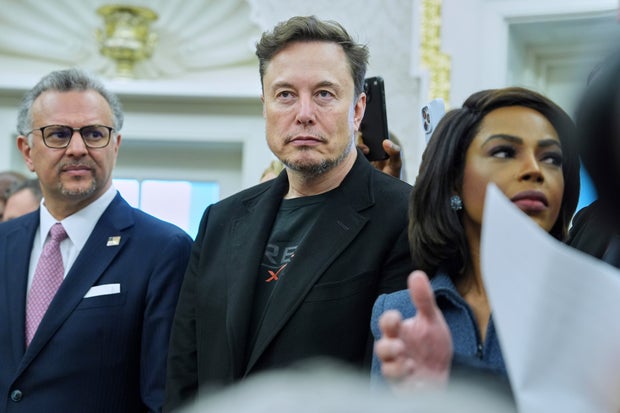Differences between President Trump and South African President Cyril Ramaphosa came to a head Wednesday afternoon in a tense exchange in the Oval Office, as Mr. Trump confronted him over whether White genocide is taking place in South Africa.
Mr. Trump and Rampahosa met for a critical conversation — with South African-born billionaire Elon Musk in the room — amid tensions between the U.S. and South Africa, after the U.S. accepted 59 White Afrikaners last week and granted them status as refugees.
At one point in the meeting, Ramaphosa took a question intended for Mr. Trump about what it would take to persuade him that White genocide is not occurring in South Africa.
“It will take President Trump listening to the voices of South Africans, some of whom are his good friends, like those who are here,” responded Rampahosa, who brought South African golfers Ernie Els and Retief Goosen and billionaire businessman Johann Rupert with him to the White House. “When we have talks between us at a quiet table, it will take President Trump to listen to them. I will not be repeating what I’ve been saying.”
Evan Vucci / AP
Mr. Trump responded that there are “thousands of stories” and “documentaries” about the situation in South Africa, before directing his staff to dim the lights in the Oval Office and play a video for everyone in the room about allegations of violence against White South Africans. The president said the images show burial sites of White farmers.
After the video concluded, Mr. Trump and Ramaphosa went back and forth about the situation.
Ramaphosa said he hadn’t seen the videos the president’s staff played and said the videos do not represent government policy. He said he and his party are “completely opposed” to the language used in the footage.
“We have dead White people, dead White farmers, mostly,” Mr. Trump said.
Others in the South African delegation who accompanied Ramaphosa told Mr. Trump the issue is not White genocide in South Africa, but rather, crime in general, affecting South Africans across demographics. Ramaphosa, too, pushed back.
“There is criminality in our country,” he said. “People who do get killed unfortunately through criminal activity, are not only White people. Majority of them are Black people.”
The Trump-Ramaphosa meeting, in which reporters were allowed in the room for over an hour, is yet another instance of the U.S. president inviting the media to witness and broadcast testy exchanges with other world leaders, instead of keeping those discussions behind closed doors.
Mr. Trump has repeatedly said White farmers in South Africa have been targets of “genocide” — an allegation South Africa and Ramaphosa have rejected — and insists South Africa is “out of control,” echoing Musk. In the meeting Wednesday, Mr. Trump said “Elon wanted” the Afrikaners to be allowed into the U.S. as refugees. During the time reporters were in the Oval Office for the meeting, Musk said nothing.
Evan Vucci / AP
The beginning of the Oval Office meeting was smoother. Mr. Trump called it a “great honor” to be with the South African president, who, he said “is certainly in some circles, really respected, other circles, a little bit less respected, like all of us, in all fairness.”
“We are essentially here to reset the relationship between the United States and South Africa,” Ramaphosa said in his opening comments.
Asked by a reporter why the government is letting White Afrikaners into the U.S. while denying entry to other refugees, the president began by lambasting the news outlet that asked the question.
“We’ve had tremendous complaints about Africa, about other countries too, from people,” Mr. Trump said. “They said there’s a lot of very bad things going on in Africa, and that’s what we’re going to be discussing today.”
“We have many people that feel they’re being persecuted,” Mr. Trump added.
Afrikaners are White South Africans of Dutch descent who have lived in South Africa for four centuries. In addition to English, Afrikaners have their own language, Afrikaans, which has its roots in Dutch and is one of 12 official languages of South Africa.
The expedited process for the Afrikaners comes as the Trump administration is working to suspend the refugee admission program, drawing multiple court challenges.
In a tense exchange during a hearing on Capitol Hill Tuesday on budget matters, Democratic Sen. Tim Kaine of Virginia asked Secretary of State Marco Rubio if the Afrikaners are more persecuted than the Uyghurs or Rohingyas, or dissidents in Cuba, Venezuela or Nicaragua, or than those who would be threatened by the Taliban, should they return to Afghanistan.
Kaine suggested the Trump administration is giving preference to Afrikaners due to the color of their skin, and asked Rubio why the U.S. should prioritize Afrikaners. Rubio said the Afrikaners are a “small subset.”
“It’s a new issue,” Rubio said. “And the president identified it as a problem and wanted to use it as an example. But that’s different from having these refugee programs that were basically spending money to put people up in communities and accommodate them, and it was acting as a magnet.”
“Let me challenge you, and I’m just going to say for the public, if you want to understand about the quote, persecution, of Afrikaner farmers, go look at the composition of the South African government,” Kaine responded. “Since July of 2024, there’s a government of national unity. And the opposition party today — the ANC — the Afrikaner Party, the Democracy Alliance, is part of the governing coalition. They joined the governing coalition a year ago, and the leader of that party was given the remit of Agriculture Minister Jan Steenhuisen, and he is the leader of the former Afrikaner party, still widely representing Afrikaners. He is the minister of agriculture in South Africa right now. I assert that this claim that there’s persecution of Afrikaner farmers is completely specious.”
Caroline Linton and
contributed to this report.


